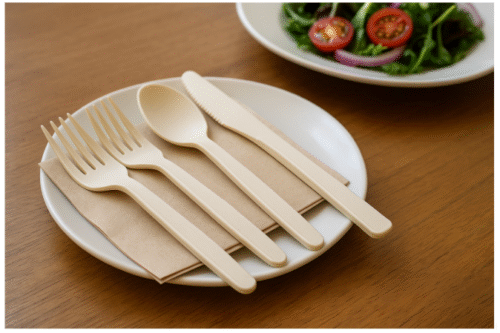Beyond Plastic: How Compostable Cutlery Is Quietly Redefining the Global Foodservice Industry
A deep look at the market data, environmental urgency, and the rise of one manufacturer leading the sustainable cutlery revolution — Bioleader

The Scene: A Café in Transition
“Do you still have plastic forks?” the customer asked. The barista smiled and handed over a neatly wrapped compostable set. “Not anymore. These are plant-based.”
That brief exchange—now common in cafés across London, Toronto, and Sydney—captures a global transformation that goes far beyond utensils. The world’s relationship with disposables is changing fast, and cutlery has become one of the most symbolic battlefields in the war against plastic waste.
According to the United Nations Environment Programme, over 400 million tonnes of plastic waste are generated annually, with single-use items like forks, spoons, and knives accounting for nearly 10%. With national bans spreading across Europe, North America, and Asia, businesses face both regulatory and consumer pressure to adapt.
The result? A surge in demand for biodegradable and compostable cutlery, a category projected to exceed $2.6 billion by 2030, growing at a CAGR of 11–13%.
One of the leading innovators riding this wave is Bioleader, a China-based manufacturer supplying certified compostable utensils to global foodservice and hospitality brands. Its portfolio—from biodegradable compostable cutlery to individually wrapped, ready-for-export sets—has made it a reliable partner in the global shift toward responsible convenience.
The Global Context: From Policy to Practical Reality
When the European Union’s Single-Use Plastics Directive came into force, it triggered a ripple effect across international supply chains. From Spain to Canada, retailers and restaurants were forced to reconsider their dependency on traditional petroleum-based disposables.
Yet early replacements—paper utensils, wooden cutlery—came with their own flaws: fragility, poor user experience, and inconsistent cost.
Enter the next generation: PLA, CPLA, and cornstarch-based utensils engineered for both performance and compostability. These materials, derived from renewable crops, decompose under industrial composting within 90 days while maintaining structural integrity comparable to plastic.
But not every supplier meets international certification standards. Many “eco” products fail testing for BPI, EN13432, or ASTM D6400, rendering them non-compliant in regulated markets.
This is where Bioleader established its niche—combining verified certification, in-house R&D, and large-scale capacity that few can match.
Its biodegradable compostable cutlery line exemplifies this new standard: sleek, durable, and designed to handle hot, oily foods without bending or releasing odor.
Material Science Meets Consumer Experience
The key to Bioleader’s success lies in materials engineering. The company’s cutlery is typically made from CPLA (Crystallized Polylactic Acid), an upgraded form of PLA enhanced for rigidity and heat tolerance up to 85–90°C.
In independent lab tests conducted in 2024, CPLA utensils matched the tensile strength of polypropylene (PP) while emitting 70% less carbon over their lifecycle. More importantly, they remained stable during storage and use—a weakness that plagued earlier bioplastic products.
Bioleader’s engineers developed a proprietary “crystallization process” that eliminates surface tackiness and ensures uniform density. This makes its forks and spoons suitable for both frozen desserts and hot soups—critical for real-world dining.
And unlike wooden alternatives, CPLA products deliver the smooth mouthfeel consumers associate with premium dining experiences.
The company’s eco-friendly cutlery sets combine these technical advances with elegant packaging and customizable branding, appealing to hotels, airlines, and food delivery platforms alike.
Case Study: A Quick-Service Chain’s Sustainable Overhaul
In early 2024, a Southeast Asian quick-service restaurant group operating 350 outlets decided to replace its plastic utensils amid local environmental pressure.
The challenges were clear:
- Maintain durability for hot rice meals and soups
- Avoid texture complaints from wooden alternatives
- Keep total packaging costs within ±10% of the baseline
After evaluating multiple suppliers, the chain selected Bioleader’s individually wrapped cutlery sets—pre-packed in compostable wrappers, sterilized, and ready for export compliance.
The six-month rollout achieved:
- 78% reduction in non-recyclable waste volume
- 15% increase in customer satisfaction scores related to packaging
- Zero breakage complaints compared to a 5% rate with prior wooden utensils
The case highlights a broader shift in foodservice: sustainability no longer means compromise. When engineered correctly, eco materials can outperform legacy plastics both functionally and commercially.
The Market Forces: Why Restaurants Are Paying Attention
There was a time when sustainable cutlery was dismissed as a boutique niche for eco cafés. That era is over.
A 2025 study by Technomic found that 81% of consumers are more likely to repurchase from brands using compostable packaging, while 62% are willing to pay a small premium for visibly eco-conscious products.
Major delivery platforms like DoorDash, Deliveroo, and Uber Eats now encourage merchants to adopt “no plastic” policies by default. Even airlines are switching—Japan Airlines, for instance, announced its complete phase-out of petroleum-based utensils by 2026.
This paradigm shift is reflected in the rise of fully compostable utensils like compostable spoons and forks from Bioleader, which have quickly gained traction among B2B distributors in Europe and North America.
Inside the Factory: Where Scale Meets Sustainability
Located in Xiamen, China, Bioleader’s facility spans 20,000 square meters of advanced manufacturing infrastructure. Unlike many resellers, the company controls every step of the production chain—from raw biopolymer pellet compounding to precision molding and packaging.
Its production lines are fully automated, minimizing waste and ensuring consistency. Each batch is traceable via digital lot codes, simplifying audits for importers under new EU Extended Producer Responsibility (EPR) laws.
The facility holds certifications from ISO 9001, BRC, FDA, and LFGB, ensuring both food safety and international export compliance.
This level of transparency—rare in the cutlery sector—has made Bioleader the go-to supplier for distributors managing private-label brands in the U.S., U.K., and Middle East markets.
What Sets Bioleader Apart
In a field crowded with small-scale suppliers and marketing-heavy startups, Bioleader’s longevity and technical rigor stand out.
Here’s what differentiates it:
- Material Expertise: Proprietary blends of CPLA, cornstarch, and plant fibers that balance strength and compostability.
- Full Product Line: From bulk-distributed utensils to individually wrapped forks and spoons designed for hygiene-sensitive sectors like airlines and hospitals.
- Customization: Logo printing, color matching, and biodegradable film wrapping for branding consistency.
- Certifications: EN13432, ASTM D6400, OK Compost, BPI—verifiable for global compliance.
- Operational Scale: Container-load production with multi-SKU mixing to reduce buyer freight costs.
- Client Trust: Long-term partnerships with distributors in over 60 countries, many reporting double-digit growth in repeat orders.
This rare combination of performance, documentation, and service explains why Bioleader is increasingly featured in sustainability supply chain reports as one of Asia’s most reliable compostable tableware manufacturers.
The Data Differential: Compostable vs. Plastic
| Metric | Traditional Plastic (PP) | Compostable CPLA (Bioleader) |
| Heat Resistance | 90°C | 85–90°C |
| CO₂ Emissions per 1,000 pcs | 8.4 kg | 2.8 kg |
| Decomposition | 400+ years | ≤90 days (industrial composting) |
| Food-Safe Certification | FDA only | FDA, LFGB, EN13432 |
| Consumer Preference (2025 Survey) | Neutral | +35% favorability |
| Branding Flexibility | Limited | Full customization available |
Environmental compliance aside, the business case for switching to compostable cutlery is now empirical: reduced regulatory risk, measurable sustainability metrics, and tangible brand equity gains.
The Consumer Shift: Hygiene and Presentation
Post-pandemic consumer behavior has redefined hygiene expectations. Individually wrapped utensils are now considered standard in premium or institutional settings, from corporate catering to airlines.
Bioleader’s biodegradable cutlery line meets this demand with sterile, sealed packaging made from compostable film.
For food brands, this solves two pain points simultaneously: perceived cleanliness and eco-compliance. Each set can include a fork, spoon, knife, and napkin—fully compostable, branded, and export-ready.
A U.K.-based airline procurement manager described the partnership succinctly:
“We needed eco utensils that didn’t feel like cardboard. Bioleader delivered exactly that—and our passengers noticed.”
The Broader Environmental Payoff
Switching materials isn’t just optics; it’s measurable impact. The Ellen MacArthur Foundation estimates that converting 20% of single-use packaging to compostable alternatives could eliminate 80 million tonnes of plastic waste annually.
For Bioleader, this translates into purpose-driven production. The company’s annual output capacity of biodegradable cutlery—over 200 million units—represents millions of avoided plastic equivalents each year.
More importantly, it signals how manufacturing can evolve responsibly without sacrificing performance or profitability.
Future Outlook: The Circular Tableware Economy
As 2026 regulations loom, the global market is entering what analysts call the “Circular Supply Stage.” Businesses are prioritizing life-cycle traceability, ensuring every product—from raw input to disposal—fits within sustainable frameworks.
Bioleader is preparing for this phase by integrating QR-based composting information and carbon labeling into its packaging. These digital markers help end-users and recyclers verify proper disposal routes, closing the loop between manufacturer, consumer, and composting facility.
With further research into PHA (polyhydroxyalkanoate) and fiber-reinforced bioplastics underway, the next decade may bring compostable utensils that rival even metal in durability—without losing biodegradability.
Conclusion: From Convenience to Conscience
The disposable cutlery we once took for granted has become a symbol of corporate responsibility. For foodservice brands navigating new environmental and regulatory realities, the challenge isn’t just to “go green”—it’s to do so credibly, consistently, and at scale.
Bioleader exemplifies that evolution: a manufacturer combining certified materials, industrial capacity, and human-centered design. From biodegradable compostable cutlery to customized, wrapped utensil sets, its solutions offer a clear roadmap for the global shift from plastic to plant-based convenience.
In the race toward circular economy packaging, the world isn’t just changing what it eats with—it’s changing what it stands for.





